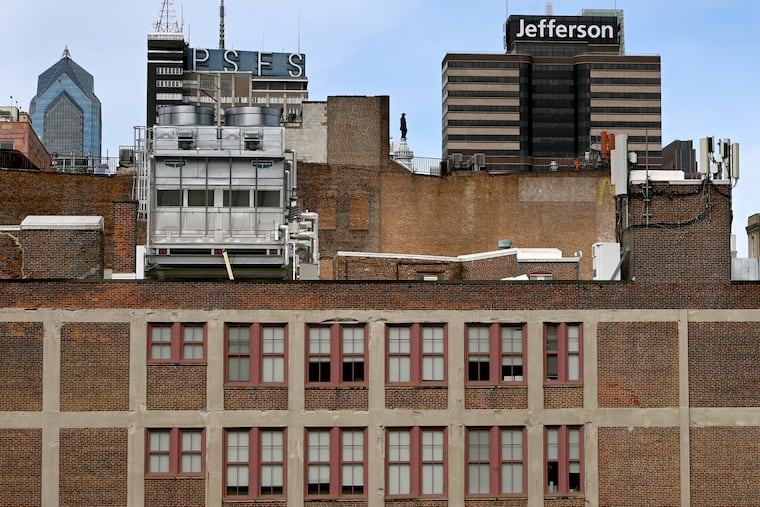Jefferson Health CEO says the system is exploring moving headquarters out of Philadelphia
Jefferson Health is one of the largest nonprofit health systems in the country, with 32 hospitals and 65,000 employees in Pennsylvania and New Jersey.

Jefferson Health is exploring options for moving its headquarters out of Philadelphia, the system’s CEO said Thursday, after rapidly growing its footprint in recent years from three to 32 hospitals stretching from South Jersey to Lehigh Valley.
The nonprofit health system does not have immediate plans for moving, but CEO Joseph Cacchione said he has spoken with Mayor Cherelle L. Parker about the possibility. Cacchione spoke at an event hosted by the Philadelphia Business Journal, which first reported the potential headquarters relocation.
“One of the things we have to think about, as much as I hate to say it, is does it make sense for our headquarters to be [in Center City],” Cacchione said.
He declined to say where the system was considering for a new headquarters. Jefferson will continue to have a “strong presence” in Philadelphia, he said.
A spokesperson for Jefferson Health declined to comment beyond Cacchione’s reported remarks. Parker’s office did not immediately respond to a request for comment. Jefferson has 10 years left on its headquarters lease.
The possibility of Jefferson leaving its headquarters on East Market Street is the latest blow to the beleaguered commercial corridor that connects City Hall to Independence Mall, where Parker seeks to foster new development.
Jefferson is the Philadelphia region’s largest health system, with a total of 32 hospitals after completing a major acquisition of Lehigh Valley Health Network last year and 65,000 employees in Pennsylvania and New Jersey.
The health system is in the middle of a 16-year lease at its 1101 Market St. headquarters in Center City, with its name glowing on a marquee atop the prominent building. Cacchione said it employs roughly 2,000 people there. Overall, Jefferson had 5,000 corporate employees, according to a financial report last fall.
Jefferson opened its 19-story, $762-million Honickman Center on Chestnut Street in 2024. The state-of-the-art building houses a range of specialties, including cancer care, transplant services, gastroenterology, and a respiratory institute.
» READ MORE: Virtual checkout at Jefferson’s Honickman Center lets patients skip the line
Jefferson is also planning to expand the emergency department at Thomas Jefferson University Hospital in Philadelphia and pursue new cancer-treatment options as part of $530 million in capital projects planned across its sprawling system.
“Jefferson is probably the largest employer in Center City right now. We have probably $96 million of wage tax that are paid to the city,” Cacchione said during the event.
The system includes one of Philadelphia’s largest teaching hospitals, busy urban emergency departments, and suburban hospitals that offer critical care in their communities. Jefferson’s latest acquisition, Lehigh Valley Health Network, is a leading health-care provider in a fast-growing region north of Philadelphia.
East Market Street in flux
The departure of Jefferson’s headquarters would be another obstacle to city leaders’ long-standing efforts to revitalize the East Market Street corridor, which was once a famous retail hub but has for decades been plagued by empty storefronts and failed megaprojects.
The corridor’s woes have been front and center for Parker and her team. Much of her first year in office was focused on the 76ers’ controversial proposal to build a new arena one block east of Jefferson’s headquarters — a high-profile plan the team framed as the key to unlocking Market East’s potential before unexpectedly abandoning it in January. The area now also faces the imminent closure of the Macy’s store in the historic Wanamaker Building, which was originally home to the nation’s first department store.
Parker has said she remains committed to returning the corridor to its former glory despite those setbacks, and the 76ers and Comcast have pledged to form a joint venture to stimulate development. But Jefferson’s talk of a move is a reminder of how similar initiatives in the past have foundered despite City Hall’s efforts.
City Councilmember Mark Squilla, whose 1st District includes Jefferson’s headquarters, said he is confident the city can work with Jefferson and stave off the potentially “major blow” of a large employer leaving Center City.
“I wouldn’t want to overreact to something like that right now,” Squilla said in an interview. “We work very closely with Jefferson. They just built a brand new building there on Chestnut Street, and we will continue to work with them.”
Squilla said he reached out to Jefferson after hearing about Cacchione’s comments but hasn’t heard back.
“Everybody has their wants and asks, but we as the city absolutely would want them to stay and have their headquarters here,” he said.
Jefferson seeing changes after acquisitions
Jefferson’s revenue increased dramatically through acquisitions to $14 billion for the year ended June 30, including Lehigh Valley Health Network, which it acquired Aug. 1. That is seven times more revenue than it had 10 years earlier.
But Jefferson, like much of the industry is contending with far weaker financial results than was typical before the coronavirus pandemic. Jefferson has had eight years of consecutive operating losses, excluding unusual items and investment income, according to Standard & Poor’s, a credit-rating agency.
Including the benefit of investment income, and after a significant change in the way Jefferson records depreciation expenses, Jefferson reported to bondholders a $1.3 million operating profit in fiscal 2024.
» READ MORE: Thomas Jefferson University had a $34 million operating profit in fiscal 2025’s second quarter
Cacchione’s remarks came three weeks after the abrupt departure of Jefferson’s chief financial officer John Mordach, who lasted less than three years in one of the health system’s most crucial corporate jobs.
Editor’s note: This story has been updated with further detail on Jefferson’s financial reporting. Staff writer Harold Brubaker contributed to this article.